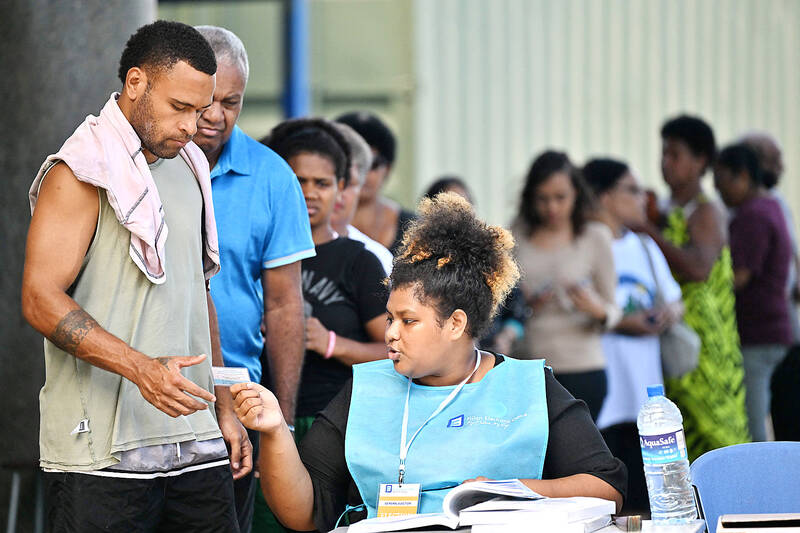Fijian Prime Minister Frank Bainimarama vowed to respect the outcome of yesterday’s election, as polls closed in a vote that could end his 16 years in power and return a rival former coup leader to office.
Bainimarama, 68, seized control of Fiji in a 2006 putsch, but legitimized his grip on power with election wins in 2014 and 2018.
Standing in the way of Bainimarama’s third elected term is former Fijian prime minnister Sitiveni Rabuka, a 74-year-old former military commander nicknamed “Rambo” after leading two coups in 1987.

Photo: AFP
The vote is seen as a test of the nation’s fledgling democracy.
Asked yesterday whether he would accept the outcome, win or lose, Bainimarama said “of course” as he cast his ballot in the capital, Suva, with his granddaughter in tow.
He then lashed out at reporters, saying they should ask “better questions.”
Fiji now faces a nervous wait for a winner to be declared — ballots must be tallied from remote islands and highland villages, and the country’s complicated counting system could further slow things down. The final count is not expected for at least two days, although provisional returns could come more quickly.
Rabuka said he would readily concede defeat if beaten, and Bainimarama should do the same.
“I think he will not. So I’m hoping for a flood of votes in our favor, so that it makes any attempt at that course futile,” he said. “We cannot live forever, we cannot rule forever, so successions from an opposition party should be accepted.”
Any arguments about the result would likely be dealt with through the courts, rather than another coup, Australian Strategic Policy Institute analyst Blake Johnson said.
“Should Rabuka win, this will be Fiji’s first test at completing a peaceful handover of power in nearly two decades,” he said. “If Bainimarama refuses to accept defeat, we could see several legal challenges tie up the parliamentary and judicial systems for some time.”
Rabuka — who is also a former Fijian international rugby player and Commonwealth Games hammer thrower — has signalled that Fiji could loosen its ties with China if he was elected.
Fiji has grown closer to Beijing under Bainimarama, who used a “look north” policy to stabilize the economy after Australia and New Zealand hit the country with heavy trade sanctions in retaliation for his 2006 coup.

A string of rape and assault allegations against the son of Norway’s future queen have plunged the royal family into its “biggest scandal” ever, wrapping up an annus horribilis for the monarchy. The legal troubles surrounding Marius Borg Hoiby, the 27-year-old son born of a relationship before Norwegian Crown Princess Mette-Marit’s marriage to Norwegian Crown Prince Haakon, have dominated the Scandinavian country’s headlines since August. The tall strapping blond with a “bad boy” look — often photographed in tuxedos, slicked back hair, earrings and tattoos — was arrested in Oslo on Aug. 4 suspected of assaulting his girlfriend the previous night. A photograph

‘GOOD POLITICS’: He is a ‘pragmatic radical’ and has moderated his rhetoric since the height of his radicalism in 2014, a lecturer in contemporary Islam said Abu Mohammed al-Jolani is the leader of the Islamist alliance that spearheaded an offensive that rebels say brought down Syrian President Bashar al-Assad and ended five decades of Baath Party rule in Syria. Al-Jolani heads Hayat Tahrir al-Sham (HTS), which is rooted in Syria’s branch of al-Qaeda. He is a former extremist who adopted a more moderate posture in order to achieve his goals. Yesterday, as the rebels entered Damascus, he ordered all military forces in the capital not to approach public institutions. Last week, he said the objective of his offensive, which saw city after city fall from government control, was to

The US deployed a reconnaissance aircraft while Japan and the Philippines sent navy ships in a joint patrol in the disputed South China Sea yesterday, two days after the allied forces condemned actions by China Coast Guard vessels against Philippine patrol ships. The US Indo-Pacific Command said the joint patrol was conducted in the Philippines’ exclusive economic zone by allies and partners to “uphold the right to freedom of navigation and overflight “ and “other lawful uses of the sea and international airspace.” Those phrases are used by the US, Japan and the Philippines to oppose China’s increasingly aggressive actions in the

‘KAMPAI’: It is said that people in Japan began brewing rice about 2,000 years ago, with a third-century Chinese chronicle describing the Japanese as fond of alcohol Traditional Japanese knowledge and skills used in the production of sake and shochu distilled spirits were approved on Wednesday for addition to UNESCO’s Intangible Cultural Heritage list, a committee of the UN cultural body said It is believed people in the archipelago began brewing rice in a simple way about two millennia ago, with a third-century Chinese chronicle describing the Japanese as fond of alcohol. By about 1000 AD, the imperial palace had a department to supervise the manufacturing of sake and its use in rituals, the Japan Sake and Shochu Makers Association said. The multi-staged brewing techniques still used today are